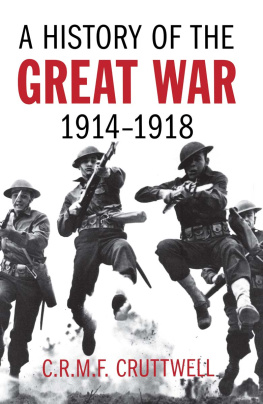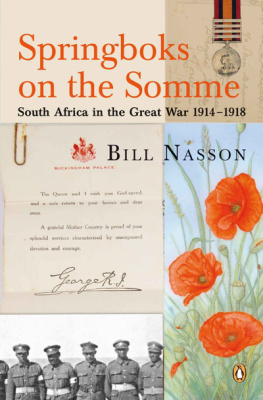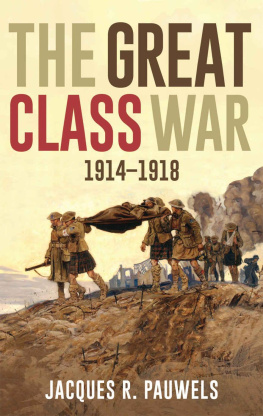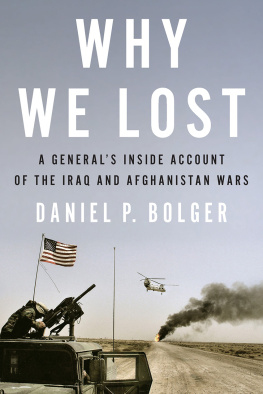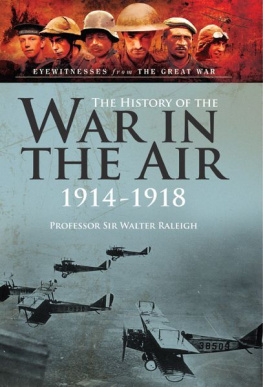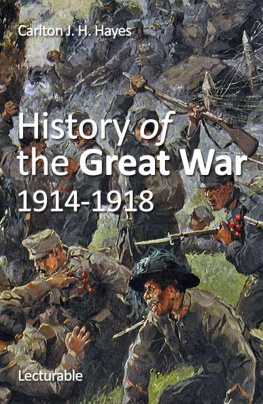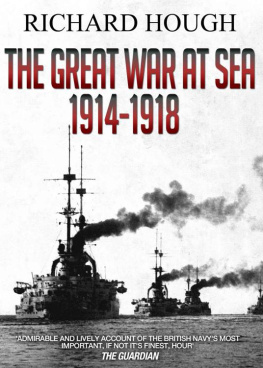C.R.M.F. Cruttwell - A History of the Great War: 1914-1918
Here you can read online C.R.M.F. Cruttwell - A History of the Great War: 1914-1918 full text of the book (entire story) in english for free. Download pdf and epub, get meaning, cover and reviews about this ebook. year: 2001, publisher: Chicago Review Press, genre: History. Description of the work, (preface) as well as reviews are available. Best literature library LitArk.com created for fans of good reading and offers a wide selection of genres:
Romance novel
Science fiction
Adventure
Detective
Science
History
Home and family
Prose
Art
Politics
Computer
Non-fiction
Religion
Business
Children
Humor
Choose a favorite category and find really read worthwhile books. Enjoy immersion in the world of imagination, feel the emotions of the characters or learn something new for yourself, make an fascinating discovery.
- Book:A History of the Great War: 1914-1918
- Author:
- Publisher:Chicago Review Press
- Genre:
- Year:2001
- Rating:5 / 5
- Favourites:Add to favourites
- Your mark:
- 100
- 1
- 2
- 3
- 4
- 5
A History of the Great War: 1914-1918: summary, description and annotation
We offer to read an annotation, description, summary or preface (depends on what the author of the book "A History of the Great War: 1914-1918" wrote himself). If you haven't found the necessary information about the book — write in the comments, we will try to find it.
A History of the Great War: 1914-1918 — read online for free the complete book (whole text) full work
Below is the text of the book, divided by pages. System saving the place of the last page read, allows you to conveniently read the book "A History of the Great War: 1914-1918" online for free, without having to search again every time where you left off. Put a bookmark, and you can go to the page where you finished reading at any time.
Font size:
Interval:
Bookmark:
Mr Cruttwell served in France as an Officer in the 1st/4th Royal Berkshire Regiment, and later as an Intelligence Officer at the War Office.
He was Principal of Hertford College, Oxford, from 1930 to 1939 and was formerly a Fellow of All Souls College, Oxford. He died in 1942.
Academy Chicago Publishers
363 West Erie Street
Chicago, Illinois 60610
Published in 1991. Reprinted 2007.
Printed and bound in the U.S.A.
Copyright 1934 C.R.M.F. Cruttwell
No part of this book may be reproduced in any form
without the express written permission of the publisher.
Library of Congress Cataloging-in-Publication Data
Cruttwell, C. R. M. F.
A history of the Great War, 1914-1918.
Includes index.
1. Word War, 1914-1918. I. Title.
D521.C7 1990 940.3 88-24133
ISBN 978-0-89733-315-3
To the Memory of
CHARLES FLETCHER

War, which takes away the comfortable provision of daily life, is a hard master and tends to assimilate mens characters to their conditions.
( JOWETTS TRANSLATION )
Sine justitia quid sunt regna nisi magna latrocinia?
ST. AUGUSTINE
T HIS book, as its title implies, is a history of the War: it deals neither with its causes remote or immediate, nor with the so-called settlement which followed. It aims at presenting the general reader with an accurate, intelligible, and interesting account of the greatest conflict between civilized states.
The War is indeed passing rapidly into history. To the younger generation now growing up it has become but the remotest and vaguest of memories; the majority of undergraduates who will be coming to the Universities this autumn were born in its third year.
Moreover, the materials now at the disposal of the historian are of such a character that he may feel reasonably confident of being able to establish the truth, if not in every detail, at least in the broad outlines of his work. A large proportion of the principal actors on either side, both political and military, have published accounts of their stewardship. These naturally have a very varying value of reliability and ingenuousness, but in almost every instance they are fortified by official memoranda and secret documents, which show the contemporary grounds on which decisions were taken. In the defeated countries (particularly in Germany) commissions of inquiry have thrown much important light on many points. Though the official histories (with the exception of that of the British navy) have not yet been completed, it is improbable that any new disclosures of serious importance remain to be made.
I have endeavoured to keep a just proportion between the military, diplomatic, and political aspects, as also between the different theatres of war, and to prevent the reader from being lost in a mass of detail. No tactical analysis of the battles has been attempted, except where it illustrates a general principle of high importance.
It has been necessary ruthlessly to omit much which it would have been interesting to include. To take a few instances, no account is given of the campaigns in Africa, of the civil war and foreign interventions in Russia after the treaty of Brest-Litovsk, or of the Irish rebellion, while the internal history of the belligerent countries is very summarily and imperfectly sketched. As I am writing for English readers, the great side-shows have been perhaps given more prominence than their intrinsic importance deserves. But as the controversy between Easterner and Westerner, still raging unabated, is mainly of British origin, it is important to follow the attempts made to strike at Germany through her weaker allies, and to estimate whether any opportunities were neglected of bringing the War to an earlier conclusion.
I have not given a bibliography, partly because I am not sure that it would be useful to the general reader, but mainly because I have called attention by footnotes at the appropriate passages to nearly a hundred and fifty books. This will probably be sufficient to glut most appetites.
This book owes much to the late C. R. L. Fletcher, to whose memory I have ventured to dedicate it. He had read through it all, with the exception of the naval chapters, when he was seized by his last illness. He was both the most exacting and kindest of critics, who habitually devoted to the works of others an enthusiasm and a laborious accuracy which many authors will hardly expend on their own creations. I also owe much gratitude to Mr. C. T. Atkinson, Fellow of Exeter College, who has read the whole work in proof. His exact and profound knowledge has saved me from many mistakes. He must not, however, be held in any way responsible for my conclusions, with a number of which he is in hearty disagreement.
The index is due to the skill and diligence of Mr. Charles Ker, formerly a scholar of Hertford College, who has generously spent part of his leave from the Indian Civil Service in compiling it.
Finally, I must express my deep gratitude to the Clarendon Press, of which I have the honour to be a delegate; to its officials, and craftsmen.
C. R. M. F. C.
September 1934.
NOTE TO SECOND EDITION
I have inserted a number of corrections which I owe to the kindness and vigilance of critics, friends, and correspondents; and have added as an appendix a chronological table of the chief events of the War, military and political, on all fronts.
INDEX
4 Gallipoli, 1915
15 The Krupp works at Essen
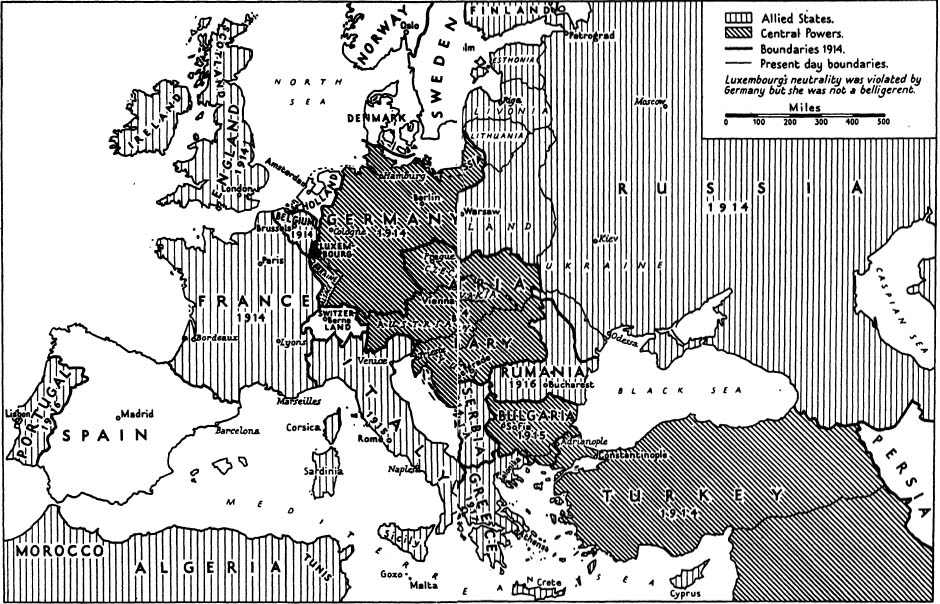
M AP. 1. EUROPE IN 1914
I
T HE great states of Europe had never been so powerfully prepared for war in human and material resources as in 1914, And this was a natural result of the policy which they had pursued. In spite of the lip-service rendered in theory and practice to international law, each had tended, partly subconsciously, to organize itself upon a basis of absolute power, and to worship its own collective image. The idea of European solidarity was no longer seen with even the deceptive clearness of a mirage. Thus the period has been well named by the author of a poignant book the international anarchy. The motive which inspired this great and increasing military organization was not so much hatred of other states as a determination to be as strong as possible without regard to the effect which any accession of strength might have abroad. It would be wrong to ascribe this determination solely to a low and material ambition. The scramble for colonies can indeed be largely set down under this head of condemnation. Though in some cases the happiness of the subject populations may have been increased, no one will assert that this was the motive which prompted the conquest. Further, this sharing out of the world largely increased the points of envy and hostile contact between nations.
But the greatest of all problems which called for the intensive organization of national power was how to use mans ever-increasing command over nature in such away as to provide greater happiness for an ever-increasing population. In democratic countries this was the direct result of the constitutional pressure of the multitude upon its governors, but even in a despotic state like Russia the fear of revolution exercised a certain intermittent influence.
Naturally the ordinary man was led insensibly to exalt the power of the state, and to demand that it should perform more and more tasks for his benefit, without adopting any such full-blooded theory as Treitschke elaborated for the Germans. Naturally also he believed that its strength was the only guarantee that he would be able to enjoy present and future benefits without interference from strong neighbours similarly organized. Moreover, the nineteenth century had identified the nation with the state to a degree hitherto unknown. Thus, on behalf of the state, the nation as a whole was prepared to make unprecedented sacrifices which were also in accordance with the democratic principle of equality. Where on the other hand the nation was not identified with the state, as in Austria-Hungary and Russia, the governing and best-organized nationalities within it had the sharpest incentive to impose no less thorough an organization, lest failure should mean disintegration. Moreover, when once the principle of universal service was firmly established on the Continent, there was little possibility of its relaxation. The ex-conscript was unwilling that younger men should escape his own burden, while to the youth itself the prospect was as natural and inevitable as going to schoolin some countries more so. Thus it came about that the nineteenth century, and in particular its last three decades, intensified and universalized the principle of universal service. It is an amazing paradox that, in the very age when the working class were everywhere gaining power and increasing in comfort, when commercial competition was becoming keener and keener, they should have been ready, nay, often anxious, to impose upon themselves this tremendous servitude and potential risk. It is impossible to explain except on the principle that they believed more and more in the power of the state, and identified the state with themselves. To say that they were deceived by their rulers is to trifle with words: You cannot fool all the people all the time.
Next pageFont size:
Interval:
Bookmark:
Similar books «A History of the Great War: 1914-1918»
Look at similar books to A History of the Great War: 1914-1918. We have selected literature similar in name and meaning in the hope of providing readers with more options to find new, interesting, not yet read works.
Discussion, reviews of the book A History of the Great War: 1914-1918 and just readers' own opinions. Leave your comments, write what you think about the work, its meaning or the main characters. Specify what exactly you liked and what you didn't like, and why you think so.

